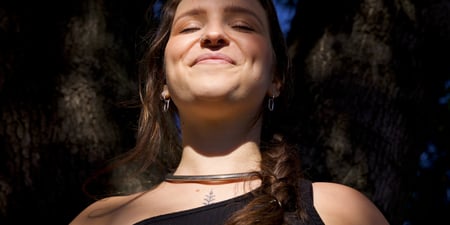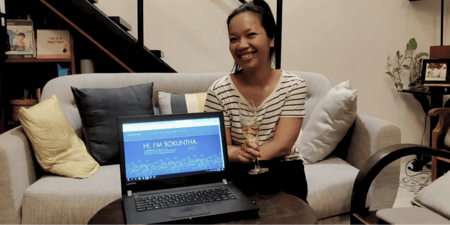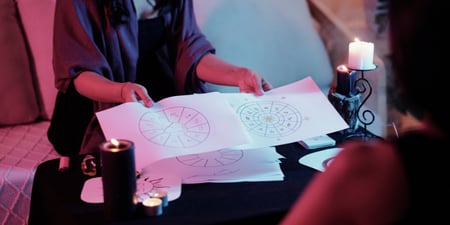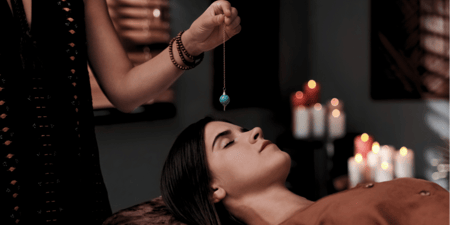- Home
- Your Sanctuary
- Wellness articles
- Pathways to Practice
- A Day in the Life
- A Day in the Life of a Forest Therapy Guide
A Day in the Life of a Forest Therapy Guide

My partner picked a bunch of pale yellow wattle and magenta gum flowers from a neighbour’s property and put them in a large glass vase on the wooden table outside the bedroom window. Both this morning and yesterday morning, I've been able to lie in bed and watch a white plumed honeyeater - mostly olive with yellow tinges and a smart white dash across where its cheekbones would be if it were human. Small, delicate, beautiful. It spends about five minutes sucking nectar from the gum flowers. The first time, I was a bit nervous it would pull the vase over and imagine the glass rolling off the wooden table and smashing on the small granite rocks the previous owner had the wisdom to lay around the perimeter of the house. But the bird is too light, and the vase has a bulging base and remains stable.
As the honeyeater flits around the flowers, it animates the arrangement so, especially when you can't see the actual bird, the flowers become alive with their own bright colour. I studied animateuring at the Victorian College of the Arts. In CVs I often gloss this as ‘theatre-making’ so people don't think I can create cartoons. But there's something lovely about being a qualified animator.
I used these skills this morning entertaining our hyperactive puppy, Maggie. I took her toy and animated it – it dances on the carpet making subtle little noises, then comes to stillness and is sometimes brave enough to tap Maggie on the nose or foot before darting away. This drives Maggie crazy - she's desperate to catch it in her jaws. Invigorated and entranced - this is the power of animation.
The other day, we were walking with a friend at Dog Rocks on Leanganook (Mount Alexander), and we were talking about whether our parents believed in God. Our friend’s parents were atheists. My partner’s dad, when introduced to the chaplain on his deathbed, said, ‘Hello… Goodbye’. I think my parents are agnostic. I didn’t say it out loud because nobody asked me, but to myself I say, ‘I think I'm an animist’. God is in everything around us, especially these wonderful granite rocks.
Of course, First Nations people are the experts at seeing the life in nature. This is Dja Dja Wurrung Country. According to a recently placed sign, this is the last place Gal Gal (dingo) was seen on Dja Dja Wurrung Country – ‘But Gal Gal’s Murrun - Living Spirit [also present in the rocks, trees and earth] is strong and one day he will return and camp again with Dja Dja Wurrung people’.
For the past week or so, I've been a little depressed. The definition of depression could be ‘lack of animation’ - certainly, it's a consequence of depression. Animator, animate thyself! Or, more truthfully - Allow the Living Spirit of the animate world you are a part of to be animated within you.
Forest Therapy (or Forest Bathing) as a formal practice originated in Japan in the 1980s, a response to the rapid increase in so-called ‘Western’ stress-related diseases (e.g. heart disease, diabetes, obesity) that had struck so many Japanese since the period of rapid industrialisation following WWII. Enlightened officials in the Japanese Forest Agency recognised their nation’s long history of working the land, looked at the country’s nature-based Shinto religion, and developed a practice of encouraging people to spend time in forests. Since then, thousands of peer-reviewed research papers from all over the world have shown that forest therapy provides participants with significant physiological and psychological benefits, and that these benefits can remain for weeks.
I love taking individuals and groups on forest therapy sessions. Partly it’s selfish – I get to benefit from participating in the activities, slowing down, enjoying breathing, deepening my listening, touching with attention, taking time to notice the beauty of the natural world. But a large part of the enjoyment is noticing the impact the gentle, guided activities are having on the participants, and hearing their stories of being reminded of a grandmother’s special dish by the smell of rosemary, or remembering a relationship with a tree they had as a child, or just appreciating the opportunity to turn off their mobile phones and enjoy being fully in nature. And that’s something we all need.
Karen is an International Nature and Forest Therapy Alliance qualified forest therapy guide, who loves to share the experience of being in the bush with others, helping them to connect and de-stress. She strives to make her clients feel more centered, relaxed and calmer so they are able to better cope with the stresses and strains of life following a guided walk. Karen is skilled at adapting forest therapy sessions to suit individuals’ needs and is known for her warm and welcoming manner. She enjoys getting people to tune into the music of the world around them by listening for natural sounds, and helping them to feel grounded during a walk.
Share this page:
- Telegram
- Messenger
- Copy link
Disclaimer: This Content has been developed from our generous global community and is intended for informational purposes only. This Content is not, nor is it intended to be, a substitute for professional medical advice, diagnosis, or treatment and should never be relied upon. Further, the personal views and experiences published are expressly those of the author, and do not represent the views or endorsement of SoulAdvisor through the act of publication on our site.
Forest therapists near you
Books
Categories
Similar articles in A Day in the Life

A Day in the Life of a Colour Therapist
Join colour therapist Pascale Osanz for a behind-the-scenes look at her uniquely vibrant workday. Fr [...]

A Day in My Life as an EFT & Matrix Reimprinting Practitioner
✽ RETURNING HOME TO YOU ✽

A Day in the Life of a Holistic Physical and Movement Specialist (and more)
Healing through presence, movement, touch, and soulful connection daily.

A Day in the Life of an Ayurvedic Health Coach
Supriya shares a gentle, real-life look at what a day guided by Ayurvedic principles can feel like — [...]

A Day in the Life of an Animal Therapist
I work as an Energy Healer for Animals, to restore health and harmony to animals and would like to g [...]

Living as an Energetic Being
Uncover the power of EFT to engage the person's inner guidance to access the root cause of their iss [...]

A Day in the Life of a Therapeutic Radiesthesyst
Dive into a world where ancient wisdom meets modern bioenergetics, and discover how energy balance i [...]

A Day in the Life of a Spiritual Healer
A heart-opening glimpse into the soulful, intuitive and transformational daily rhythm of a spiritual [...]

From Island Dreams to Global Impact
A soul-led therapist guiding deep healing through psychology, astrology, and heartfelt presence.

A Day in the Life of a Colon Hydrotherapist
Step inside the quiet ritual of colon hydrotherapy—where physical release meets emotional healing

Footnotes from the Heart: My Life as a Reflexologist
A joyful glimpse into the hands-on world of reflexology—where feet tell stories, healing begins with [...]

A Day in the Life of an Akashic Records Consultant
A day in my life as an Akashic Records Consultant and Soul-Inspired Mentor is anchored in love, pres [...]

A Day in the Life of a Brain Gym Practitioner
Step into a day of balance, movement, and mindful connection with Brain Gym practitioner Carolyn Kin [...]

A Day in the Life of a Kinesiologist: Healing, Holding Space & Running a Practice
Healing hands meet business flow in this real-life look at a kinesiologist’s daily rhythm.

A Day in the Life of a Numerologist
Discover how numbers weave memory, destiny, and wonder into a life lived in deep resonance.

A Day in the Life of a Reconnective Healing Practitioner
A Reconnective Healing Practitioner’s day sparkles with gratitude and joy! From global connections a [...]

A Day in the Life of an Ancestral Lineage Healing Facilitator
A sacred journey of ancestral healing, reconnection, and embodied remembering.

Social Work and The Soul
Blending clinical skill with soul-centered healing, one sacred story at a time.

A Day in the Life of a Rapid Transformational Therapist
Karolina Krzysztofik is a mindfulness coach, RTT therapist, and founder of Aikyam Healing, empowerin [...]

A Day in the Life of a Craniosacral Therapist and Shamanic Healer
Diana Nguyen shares a grounded glimpse into her daily life as a craniosacral therapist and shamanic [...]

From Stories to Science: Brains, Beliefs, and Becoming
A story about how curiosity, science, and mindfulness come together to help us understand the mind, [...]

A Day in the Life of a Sovereign Queen Coach
A glimpse into how a Sovereign Queen Coach embodies freedom, balances global clients, integrates anc [...]

A Day as a ThetaHealing® Practitioner
A personal journey of healing, connection, and nature’s quiet wisdom through the eyes of a ThetaHeal [...]

A Day in the Life of a Hatha Yoga Teacher
It’s raining – again, dawn creeping blearily through the windows. So the morning dog walk will have [...]

A Day in the Life of a Satyananada Yoga Teacher
From mantra chanting at dawn to grounding yoga classes by day and thoughtful rituals by night, Satya [...]

A Day in the Life of an Energy Healer
Step into the world of an energetic health practitioner and experience the magic of energy healing. [...]

Living a Life with Transference Healing®
Embark on a transformative journey with Transference Healing®, a powerful modality that accelerates [...]

A Journey Through the Eyes of a Yoga Teacher
When we become a Yoga Teacher, we have no idea where this will lead us. Most of us start out wanting [...]

A Day in the Life of a Sound Healer
Every day as a sound healer is a beautiful adventure. From intimate one-on-one sessions to vibrant g [...]

A Day in the Life of a Life Coach
Ever wondered what a life coach’s day really looks like? From mindful morning rituals to transformat [...]
Similar articles in Pathways to Practice

A Day in the Life of a Colour Therapist
Join colour therapist Pascale Osanz for a behind-the-scenes look at her uniquely vibrant workday. Fr [...]

A Day in My Life as an EFT & Matrix Reimprinting Practitioner
✽ RETURNING HOME TO YOU ✽

A Day in the Life of a Holistic Physical and Movement Specialist (and more)
Healing through presence, movement, touch, and soulful connection daily.

How to Become an Astrologer
Unlock the secrets of the stars and guide others to their life's purpose. Learn the path to becoming [...]

How to Become a Spiritual Healer
Feel called to heal mind, body, and soul? Explore the path to becoming a successful spiritual healer [...]

How to Become a Life Coach
Ready to embark on a career in life coaching? This guide provides a clear path to success, including [...]

How To Become an Acupressure Practitioner
Discover the potential of acupressure therapy – a non-invasive technique rooted in Traditional Chine [...]

A Day in the Life of an Ayurvedic Health Coach
Supriya shares a gentle, real-life look at what a day guided by Ayurvedic principles can feel like — [...]

A Day in the Life of an Animal Therapist
I work as an Energy Healer for Animals, to restore health and harmony to animals and would like to g [...]

How to Become a Yoga Teacher
Yoga teaching is not a quick career path; it is a calling. Discover the importance of lineage, mento [...]

Living as an Energetic Being
Uncover the power of EFT to engage the person's inner guidance to access the root cause of their iss [...]

A Day in the Life of a Therapeutic Radiesthesyst
Dive into a world where ancient wisdom meets modern bioenergetics, and discover how energy balance i [...]

A Day in the Life of a Spiritual Healer
A heart-opening glimpse into the soulful, intuitive and transformational daily rhythm of a spiritual [...]

How to Become a Kinesiologist
Discover the skills, training pathways, and career opportunities in kinesiology. From private practi [...]

How to Become an Energy Healer
Discover the training pathways, essential skills, and key qualities to thrive as an energy healer Fr [...]

From Island Dreams to Global Impact
A soul-led therapist guiding deep healing through psychology, astrology, and heartfelt presence.

A Day in the Life of a Colon Hydrotherapist
Step inside the quiet ritual of colon hydrotherapy—where physical release meets emotional healing

Footnotes from the Heart: My Life as a Reflexologist
A joyful glimpse into the hands-on world of reflexology—where feet tell stories, healing begins with [...]

A Day in the Life of an Akashic Records Consultant
A day in my life as an Akashic Records Consultant and Soul-Inspired Mentor is anchored in love, pres [...]

A Day in the Life of a Brain Gym Practitioner
Step into a day of balance, movement, and mindful connection with Brain Gym practitioner Carolyn Kin [...]

A Day in the Life of a Kinesiologist: Healing, Holding Space & Running a Practice
Healing hands meet business flow in this real-life look at a kinesiologist’s daily rhythm.

A Day in the Life of a Numerologist
Discover how numbers weave memory, destiny, and wonder into a life lived in deep resonance.

A Day in the Life of a Reconnective Healing Practitioner
A Reconnective Healing Practitioner’s day sparkles with gratitude and joy! From global connections a [...]

A Day in the Life of an Ancestral Lineage Healing Facilitator
A sacred journey of ancestral healing, reconnection, and embodied remembering.

Social Work and The Soul
Blending clinical skill with soul-centered healing, one sacred story at a time.

A Day in the Life of a Rapid Transformational Therapist
Karolina Krzysztofik is a mindfulness coach, RTT therapist, and founder of Aikyam Healing, empowerin [...]

A Day in the Life of a Craniosacral Therapist and Shamanic Healer
Diana Nguyen shares a grounded glimpse into her daily life as a craniosacral therapist and shamanic [...]

From Stories to Science: Brains, Beliefs, and Becoming
A story about how curiosity, science, and mindfulness come together to help us understand the mind, [...]

A Day in the Life of a Sovereign Queen Coach
A glimpse into how a Sovereign Queen Coach embodies freedom, balances global clients, integrates anc [...]

A Day as a ThetaHealing® Practitioner
A personal journey of healing, connection, and nature’s quiet wisdom through the eyes of a ThetaHeal [...]

A Day in the Life of a Hatha Yoga Teacher
It’s raining – again, dawn creeping blearily through the windows. So the morning dog walk will have [...]

A Day in the Life of a Satyananada Yoga Teacher
From mantra chanting at dawn to grounding yoga classes by day and thoughtful rituals by night, Satya [...]

A Day in the Life of an Energy Healer
Step into the world of an energetic health practitioner and experience the magic of energy healing. [...]

Living a Life with Transference Healing®
Embark on a transformative journey with Transference Healing®, a powerful modality that accelerates [...]

A Journey Through the Eyes of a Yoga Teacher
When we become a Yoga Teacher, we have no idea where this will lead us. Most of us start out wanting [...]

How to Become a Reiki Practitioner
Step into your calling—become a Reiki practitioner and heal others. Discover your innate ability to [...]

A Day in the Life of a Sound Healer
Every day as a sound healer is a beautiful adventure. From intimate one-on-one sessions to vibrant g [...]

A Day in the Life of a Life Coach
Ever wondered what a life coach’s day really looks like? From mindful morning rituals to transformat [...]

How to Become a Clinical Psychologist
Transform lives with clinical psychology—where science meets healing.

How to Become an Acupuncturist?
Discover the ancient art of acupuncture and its thriving global career path. From traditional traini [...]

How to Become an RTT Therapist
Learn Rapid Transformational Therapy (RTT), a powerful therapy combining hypnotherapy, NLP, CBT, and [...]

